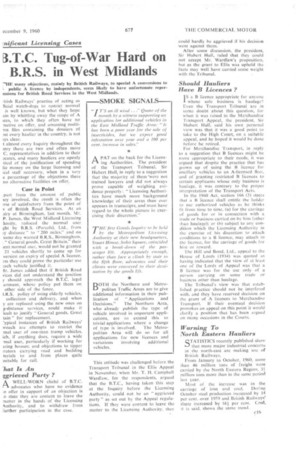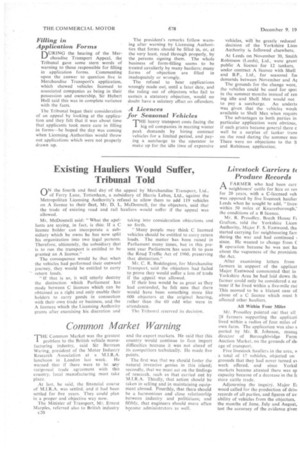3.T.C. Tug-of-War Hard on B.R.S. in West Midlands
Page 55

Page 56

If you've noticed an error in this article please click here to report it so we can fix it.
many objections, mainly by British Railways, to special A conversions to L public A licence by independents, seem likely to have unfortunate reperissions for British Road Services in the West Midlands.
r.itish Railways practice of acting as ficial watch-dogs to restrict normal is well known, but what they hope sin by whittling away the scope of A ices, to which they often have no native on offer, and amassing multinis files containing the dossiers of ast every haulier in the country, is not tys clear.
t almost every Inquiry throughout the ntry there are two and often more C. representatives in addition to their acmes, and many hauliers are openly tical of the justification of spending lic money on the large licensing and ical staff necessary, when in a very e percentage of the objections there no alternative facilities on offer.
Case in Point
part from the amount of public icy involved, the result is often the :rse of satisfactory from the point of ✓ of BritiSh Road Services, At an airy at Birmingham, last month, Mr. P. James, the West Midland Licensing hority, reduced the normal user ght by B.R.S. (Parcels), Ltd.. from ty distance "200 miles," and on same day warned B.R.S., Birmingham, ." General goods, Great Britain," their tent normal user, would not be granted 21 vehicles shortly to come up for version on expiry of special A licence, ess they could prove the particular use each vehicle justified it.
Ir. James added that if British Road vices did not understand the position y should approach the B.T.C. legal artment. whose policy put them on other side of the fence.
I.R.S. policy of using elderly vehicles, collection and delivery, and when y are replaced using the new ones on g-distance services, could make it icult to justify " General goods, Great tam" for replacement.
"ypical instances of British Railways' troach are attempts to restrict the mat user of one-man tramp vehicles, ich, if anything does, require a wide .mal user, particularly if working for aring houses; and objections to tipper :rators carrying road and building terials to and from places quite suitable for rail.
hat is An ;grieved Party ?
AWELL-WORN cliche of B.T.C. advocates who have no evidence .o offer in support of an objection is o state they are content to leave the natter in the hands of the Licensing Authority, and to withdraw from iurther participation in the case.
This attitude was challenged before the Transport Tribunal in the Ellis Appeal in November, when Mr. T. H. Campbell Wardlaw, for the respondents, argued that the B.T.C., having taken this step at the Inquiry before the Licensing Authority, could not he an " aggrieved party" as set out by the Appeal regulations. If they were content to leave the matter to the Licensing Authority, they could hardly be aggrieved if his decision went against them.
After some discussion, the president. Sir Hubert Hull, ruled that they could not accept Mr. Wardlaw's proposition, but as the grant to Ellis was upheld the facts may well have carried some weight with the Tribunal.
Should _Hauliers Have B Licences ?
IS a B licence appropriate for anyone whose sole business is haulage'? Even the Transport Tribunal are in some doubt about this question, for when it was raised in the Merchandise Transport Appeal, the president, Sir Hubert Hull, said his own personal view was that it was a good point to take to the High Court, on a suitable appeal, and he hoped it would be done before he retired.
For Merchandise Transport, in .reply to a suggestion that B licences might be more appropriate to their needs, it was argued that despite the practice that has grown up of using the B licence for ancillary vehicles to an A-licensed fleet, and of granting restricted B licences to certain applicants whose only business is haulage, it was contrary to the proper interpretation of the Transport Acts.
In the 1960 Act, section 166 (3) states that a B licence shall entitle the holder to use authorized vehicles as he thinks fit from time to time, (a) for the carriage of goods for or in connection with a trade or business carried on by him (other than haulage); or (h) subject to any condition which the Licensing Authority in the exercise of his discretion to attach conditions to a B licence, may attach to the licence, for the carriage of goods for hire or reward.
The Hill and Bond, Ltd., appeal to the House of Lords (1934) was quoted as having indicated that the view of at least one of the Lords of Appeal was that a B licence was for the use only of a person carrying on some trade or business other than haulage.
The Tribunal's view was that established practice should not be interfered with, and they have reserved decision on the grant of A licences to Merchandise Transport. If their eventual decision provokes an appeal on this point it would clarify a position that has been argued on many occasions in the Courts.
Warning To North Eastern Hauliers
STATISTICS recently published show that more major industrial concerns in the north-east are making use of British Railways.
From January to October, 1960, more
than 46 million tons of freight were carried by the North Eastern Region, 31 million tons more than in the same period last year.
Most of the increase was in the carriage of iron and coal. Dating October steel production increased by 14 per cent. over 1959 and British Railways' share increased by 161 per cent. Coal, it is said, shows the 'same trend.
Filling in
nURING the hearing of the Mer
chandise Transport Appeal, the Tribunal gave some stern words of warning to those responsible for filling in application forms. Commenting upon the answer to question five in Merchandise Transport's application, which showed vehicles licensed to associated companies as being in their possession and ownership, Sir Hubert Hull said this was in complete variance with the facts.
The Tribunal began their consideration of an appeal by looking at the application and they felt that it was about time that applicants took more care in filling in forms—he hoped the day was coming when Licensing Authorities would throw out applications which were not properly drawn up. The president's remarks follow warning after warning by Licensing Authorities that forms should be filled in, or, at the very least, read through properly, by the persons signing them. The whole business of form-filling seems to be treated cavalierly by many hauliers; many forms of objection are filled in inadequately or wrongly.
The refusal to hear applications wrongly made out, until a later date, and the ruling out of objectors who fail to sustain a statutory objection, would no doubt have a salutary effect on offenders.
A Licences for Seasonal Vehicles
THE heavy transport costs facing the big oil companies in meeting winter peak demands by hiring contract vehicles far a limited period, and paying a surcharge to the operator to make up for the idle time of expensive
vehicles, will be greatly reduced decision of the Yorkshire Lice! Authority is followed elsewhere.
At Leeds on November 30, Smith Robinson (Leeds), Ltd., were grant public A licence for 12 tankers, under contract A licence with Shell and B.P., Ltd., for seasonal flu demands between November and Al The grounds for the change were, the vehicles could be used for spot in the summer months instead of ren ing idle and Shell Mex would not to pay a surcharge. An underta was given that the vehicles wont( available to Shell Mex when requirc The advantages to both parties in particular application were obvious, if such grants became general there c well be a surplus of tanker trans on the road during the summer moi There were no objections to the S and Robinson application.
























































































































